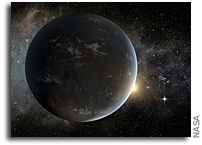The Imprecise Search for Habitability

As planets are being discovered around other stars by the thousands, several scientific disciplines that traditionally exist in parallel are converging, including astronomy, planetary science, and biochemistry.
They share an ultimate goal: to locate and identify life elsewhere in the Universe. We are engaged in a search for habitability–conditions suitable for life–despite missing a clear definition of what life is. We are hunting for what we cannot yet sharply define. Nevertheless, we can make some informed inferences about what life needs.
From our one example of life discovered so far, it appears that liquid water is an essential ingredient. If an exoplanet orbits at the appropriate range of distances from its star to allow liquid water to exist on its surface, then it is said to be in the habitable zone–not too hot, not too cold, purportedly just right for living things.
Kevin Heng
(Submitted on 18 Apr 2016)
Hunting for Alien Habitats Without Defining Life?
Comments: Published in American Scientist, May/June 2016 Issue, Volume 104, Pages 146 to 149
Subjects: Earth and Planetary Astrophysics (astro-ph.EP)
Cite as: arXiv:1604.05078 [astro-ph.EP] (or arXiv:1604.05078v1 [astro-ph.EP] for this version)
Submission history
From: Kevin Heng
[v1] Mon, 18 Apr 2016 10:47:01 GMT (40kb)
http://arxiv.org/abs/1604.05078








